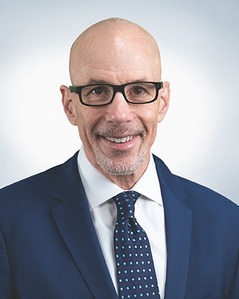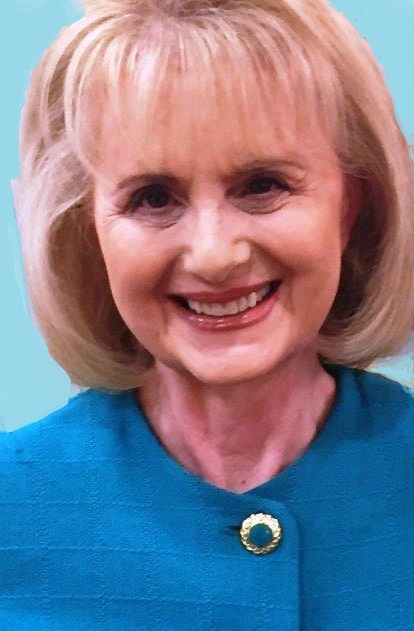The Key That May Finally Unlock the Door to Health Care Transformation
View from the C-Suite: Stephen K. Klasko, MD, MBA, President, Thomas Jefferson University and CEO, Jefferson Health
// By Jane Weber Brubaker //
 There are two words Steve Klasko uses a lot: “What if…?” Like other visionary health system leaders, he’s scaling up to meet the reality of health care today, while at the same time “unscaling” it to transform it for tomorrow.
There are two words Steve Klasko uses a lot: “What if…?” Like other visionary health system leaders, he’s scaling up to meet the reality of health care today, while at the same time “unscaling” it to transform it for tomorrow.
Things are changing when the CEO of a major health system comprising 14 hospitals — soon to be 18 — tosses around phrases like “health care at any address” and says things like, “We want to be the partner for those people who want to thrive without health care getting in the way.”

Steve Klasko, MD, MBA, CEO of Jefferson Health and president of Thomas Jefferson University
The definition of an iconoclast is “a person who attacks cherished beliefs and institutions.” So in the truest sense, Steve Klasko, MD, MBA, CEO of Jefferson Health and president of Thomas Jefferson University, is not an iconoclast, because no one cherishes the current health care system. What he is interested in is breaking down the barriers to innovation that have held the industry back, to the detriment of patients.
We listened in on a lively conversation held during Becker’s Healthcare 11th Annual Meeting Virtual Experience in May between Klasko and conference co-chair Rhoda Weiss, Ph.D., president of Rhoda Weiss Consulting Group and a member of the Strategic Health Care Marketing editorial advisory board. The two covered a range of topics, from telehealth to social disparities to Jefferson Health’s latest acquisition. The common theme across all was technology-enabled innovation that improves patients’ lives.
Klasko has partnered with successful Silicon Valley entrepreneurs — including Hemant Taneja, initial investor in companies like Livongo and Airbnb and author of Unscaled — to reconceive health care.
Klasko muses about breeding the “old math” of traditional academics, inpatient revenue, and in-person tuition with the “new math” of innovation and strategic partnerships. Speaking of Taneja and how his way of looking at the world could inspire a new way of thinking about health care delivery, Klasko wonders aloud, metaphorically, “What if you [new math] and I [old math] got married and had a kid? What would that kid [health care transformation] look like?”
As he sees it, bringing the right partners together may be the key.

Rhoda Weiss, Ph.D., president of Rhoda Weiss Consulting Group, and co-chair, Becker’s Healthcare 11th Annual Meeting Virtual Experience
In Weiss’s introduction of Klasko at the conference, she noted, “Under his leadership, Jefferson Health has grown exponentially, from three hospitals to 14, from operating revenue of $1.5 billion to $5.5 billion.”
But underneath the existing paradigm of bigger-means-better, there’s some strategic shapeshifting going on. Klasko is leveraging the power and influence of the organizations he steers to radically change health care from inside the system.
“Everybody asks me, ‘What did the pandemic teach you?’” he says. “I think what we learned is we can’t just tinker with the system and hope that the health care system will transform,” he says.
Years before the pandemic, Klasko made a strategic investment in telehealth, partnering with Teledoc. “You’ve got to imagine going to an academic faculty and saying, ‘Let’s take a little bit from NIH funding and a little bit from the next MRI and put something on telehealth,’” he says. “It was like teaching Satanism.”
But the investment paid off in 2020 when virtual visits took off like a rocket. “We did something like 100,000 visits between 2015 and 2020 and matched that in a few months during the pandemic,” he says.
Telehealth is one of many ways Klasko envisions delivering health care “at any address.”
Propagating Digital Health
For years, aspiring health tech entrepreneurs have tried to crack the code when it comes to making inroads in health care, but their pitches often fall on deaf ears. Klasko remarks, “I got tired of going to HIMSS and getting accosted by 24-year-olds telling me how they’re going to transform health care with their app if I bought it.”
What will work, in his view, is the right partnerships with likeminded venture-backed technology companies. Livongo is one such example. Livongo offers technology-enabled programs through employers or health insurance plans that help people with chronic conditions like diabetes manage their health. Livongo merged with Teledoc in August 2020 in a deal valued at $18.5 billion. The merger, finalized amid the pandemic, highlights the massive shift toward access and care outside the walls of health care facilities.
Jefferson partnered with Livongo to offer employees access to the diabetes program and saw positive clinical and financial results. It is the kind of remote patient monitoring initiative that gets Klasko excited. “What I’ve gotten passionate about is making sure that everything we do is starting to get care out to where patients are,” he says. “Nobody wakes up in the morning and says, ‘I’m a diabetic patient.’ They say, ‘I’m a person that would love to be able to thrive without diabetes getting in the way.’ We want to be the partner for those people that want to be able to thrive without health care getting in the way.”
Addressing Health Inequities
Other innovative partnerships are helping Jefferson address social disparities. “The number-one reason people got hospitalized or died from the pandemic in Philadelphia was their Zip code,” he says. “Why? Because 22 percent of people in Philadelphia don’t have broadband connectivity.” Jefferson is working with Comcast and making significant investments to expand broadband connectivity.
Food deserts are a cause of poor nutrition in underserved communities. To work toward eliminating them, Jefferson is partnering with Zipline to provide drone-delivered healthy food directly to consumers. Taking the idea a few steps further, Klasko wonders, “What if we had a health policy where you got 30 percent more food, if you had government assistance, if you’re willing to serve your family healthy food?”
Community Partnerships
Last year Jefferson received a $5 million gift from Andréa and Ken Frazier (Ken Frazier currently serves as CEO of Merck) to establish a stroke prevention center — The Frazier Family Coalition for Stroke Education and Prevention.
The stroke prevention center is a partnership between Thomas Jefferson University and Temple University, and will serve the Allegheny West neighborhood, ranked almost last among Philadelphia neighborhoods for health outcomes, according to Temple’s announcement of the partnership.
In another major move, Jefferson has been approved by the FTC to acquire Einstein Health Network, a safety net hospital in Philadelphia. “We will now be an $8.2 billion, 18-hospital system … and now a Medicaid/Medicare Advantage plan,” Klasko says. “That opens up so many opportunities for us to go directly to patients.”
“Non-Contiguous” Expansion
Klasko envisions other creative partnerships to bring about the hoped-for transformation in health care. “What if four or five [U.S. health system innovation centers] got together in an innovation supersite, so that when a VC really wanted to make splash, he could go to all of us?” he asks. “How can we bring those relationships together and really start to transform health care nationally?”
Unlike Hall of Fame basketball player Jason Kidd, Klasko’s goal isn’t to turn the team around 360 degrees. “The good news is we’re not doing that anymore,” he says. “We are actually moving forward and turning health care into the consumer revolution.”
Klasko and Taneja co-authored the book UnHealthcare: A Manifesto for Health Assurance, published in May 2020 as the pandemic was surging across the world. Its foreword states: “The pandemic … strengthened Steve and Hemant’s view that real change will come as tech entrepreneurs and the traditional health care ecosystem work together together instead of against each other…”
They call the new kind of care “health assurance.” Here are the principles guiding the concept.
10 Principles of Health Assurance Policy Design
- Reward health, not sickness.
- Create an environment conducive to open innovation.
- Put consumers in charge of their data.
- Give patients the power to be informed consumers.
- Assure everyone access to good, affordable care, with premium services on top of that.
- Focus on safety, less on efficacy.
- Don’t protect the status quo, and help health assurance emerge
- Reposition and retrain health care professionals and workers.
- Get ahead of AI.
- Stop trying to pass a “Big Bang” solution.
Taneja, Hemant; Klasko, Stephen; Maney, Kevin. UnHealthcare: A Manifesto for Health Assurance (p. 62). Lulu.com. Kindle Edition.
Jane Weber Brubaker is executive editor of Plain-English Health Care, a division of Plain-English Media. She directs editorial content for eHealthcare Strategy & Trends and Strategic Health Care Marketing, and is past chair of the eHealthcare Leadership Awards. Email her at jane@plainenglishmedia.com.
